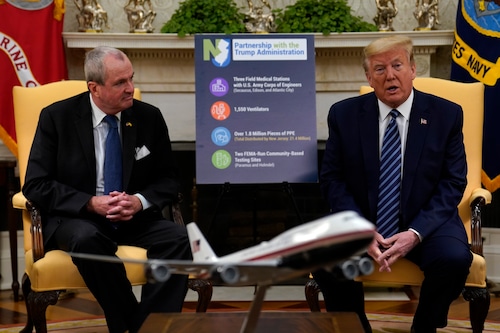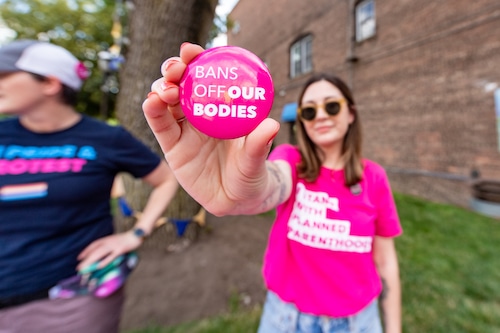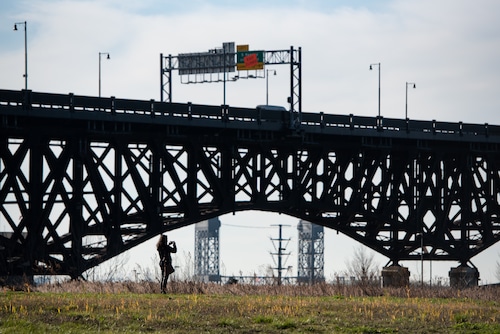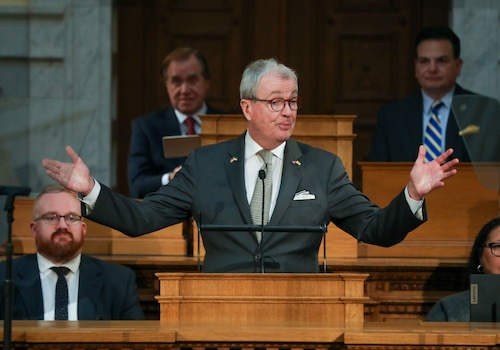
Gov. Phil Murphy delivers his fiscal year 2026 state budget address at the Statehouse in Trenton on Tuesday.Ed Murray| For NJ Advance Media
Gov. Phil Murphy on Tuesday unveiled his final state budget proposal, calling for New Jersey’s government to spend a record $58.1 billion, including preserving property-tax relief and continuing full public-worker pensions payments but also seeking $1.2 billion in fees and taxes on items such as alcohol, cigarettes, luxury homes, and internet gambling.
Murphy’s proposal, for the 2026 fiscal year that begins July 1, would spend $1.2 billion more in taxpayer funds than it is projected to take in. That’s compared to the $2.2 billion “structural deficit” in the $56.6 billion budget Murphy signed last year. Sources also told NJ Advance Media the state faced a roughly $3.7 billion deficit a few weeks ago.
Since then, leaders closed part of the gap by cutting $2 billion in spending, including $800 million in grants lawmakers add at the last minute in June and imposing new taxes and fees. In addition, the state has enjoyed a bigger-than-anticipated boost in income tax collections, officials say.
“Though the budget I present to you today is the final budget of our administration, it is one that reflects our ongoing — and unrelenting — commitment to building a state that is stronger, fairer, and more prepared for the future," Murphy said Tuesday in his budget address at the Statehouse in Trenton.
The spending plan includes a $6.3 billion surplus to ensure the next governor will inherit one that will be more than 15 times greater than Murphy got when he took office in 2018.
“With this proposal, we’re getting New Jersey’s budget back on the road toward balance, so we can uphold our obligation to keep our fiscal house in the best shape possible,“ Murphy said.
But that surplus still may not be enough to withstand billions of dollars in proposed Medicaid cuts, based on a plan by Congressional Republicans to slash the health insurance program for the poor and disabled. There is also deep uncertainty over other possible spending cuts from Republican President Donald Trump’s new administration.
“I think it’s safe to say that we are facing more uncertainty at the federal level than at any other point in modern history,” Murphy, a Democrat, said. “And this uncertainty has a direct impact on all of us, and most importantly, the people of New Jersey.”
“And while I sincerely hope that the situation in Washington settles down, and that we, in turn, have a normal, healthy budget season over the next few months, that is by no means a guarantee. I have every intention of working — in good faith — with the Trump administration to better the lives of the people we serve," Murphy added.
But he noted: “We must acknowledge — and adapt to — this new reality."
The looming threat of Medicaid cuts would be “a game changer,” state Treasurer Elizabeth Muoio said before the speech.
“This is something we really have to be laser-focused on in the coming months,” she said.
Republicans, the minority party in the state Legislature, condemned the spending plan, saying it will leave the next governor in a tough position. There are 11 major candidates running from both parties in the governor’s race this year to succeed term-limited Murphy.
Critics also noted the plan’s $58.1 billion price tag is 67% larger than the last budget before Murphy took office in 2018.
“This budget is anything but affordable,” state Assemblywoman Nancy Munoz, R-Union, said.
The new Stay NJ property-tax relief program for seniors is one example of Murphy passing the buck, Republicans say. Murphy proposal, plus the two prior budgets, would pour $600 million into the program. That would allow the first round of checks to go out in 2026 to residents 65 and older who earn less than $500,000 a year. But the money runs out in six months, requiring the next governor to find the $1.2 billion needed to pay for a full year of the benefit.
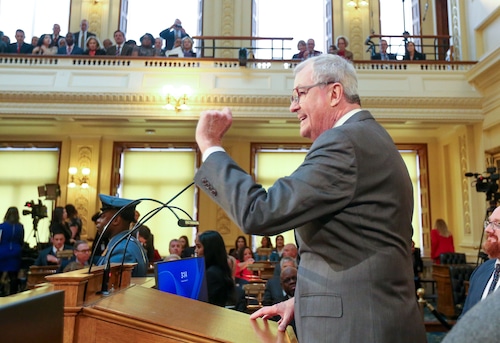
Gov. Phil Murphy delivers his fiscal year 2026 state budget address at the Statehouse in Trenton on Tuesday.Ed Murray| For NJ Advance Media
Murphy and leaders of the Democratic-controlled Legislature will now negotiate a final budget, due June 30. There will be public hearings on Murphy’s plans in the coming months.
Here’s a look at the big points of the governor’s proposal:
$1.2 billion in new fees and taxes
The budget does not contain any broad-based tax increases, such as a hike in the sales tax or income tax. But it identifies new services to tax or raises the amount of existing taxes or fees. Here are some:
- Home sales of $1 million or more: People who buy homes for $1 million to $2 million would pay a 2% assessment, up from the existing 1%; and 3% for homes sold for more than $2 million. The state expects to collect $317 million.
- Internet gaming and sports betting: Casinos now pay a 13% tax on on revenues earned through sports betting and 15% on internet gaming proceeds. Murphy proposes raising it to 25%. The state expects to gain $402.4 million.
- Cigarettes, alcohol and vapes: A tax hike of 30 cents, up from 10 cents, on vaping liquid would net the state $10 million. A 10% tax increase on alcoholic beverages would bring $18.5 million. The tax on a pack of cigarettes would climb 30 cents to $3.00, generating $41 million.
- New taxes on previously untaxed services: The state anticipates collecting $277 million by taxing go-cart racing, laser tag, bowling, interior design services, horse training, vehicle trade-ins, some comped meals, tickets, and hotel rooms. Murphy also wants to end a sales tax exemption and the $20,000 sales tax cap on boats. A bright spot: He wants to stop taxing the sale of baby products and sunscreen.
- Truck traffic: There’s a $2 truck traffic excise fee on warehouses, raising an estimated $20 million while also “mitigating the impact on new warehouse development”.
Property-tax relief
The proposal contains $4.3 billion on programs that provide direct property-tax relief. There’s level-funding to maintain the ANCHOR program for 2 million people, the Property Tax Deduction Act and the Senior Tax Freeze, which benefitted 235,000 residents. There’s also $600 million for Stay NJ, the newest program for about 432,000 seniors that is set to begin in 2026.
“Back in 2018, the average, eligible homeowner in New Jersey received $246 in property tax relief. This year, that average tax relief payment will be over $1,500 — a more than 500% increase in just seven years," Murphy said.
School aid
The proposal contains $436.8 million in additional public school aid, which is the largest payment to date under the School Funding Reform Act. The full tab is $12.1 billion serving 1.4 million students.
“With this funding, we are not merely investing in the success of our state’s students,” Murphy said. “We are also helping every working parent save more of their money. Because every additional dollar the state spends on public education is a dollar our families get to save in property taxes.”
Some school districts, particularly in Republican areas, have been frustrated by the loss in funding. Murphy says the budget will “ease volatility” by limiting losses.
The proposal would also spend $10 million to expand pre-kindergarten programs.
Another full pension payment
For the fifth consecutive year, Murphy plans to dedicate a full $7.2 billion payment in the pension fund for public workers. He noted his administration will have made $47 billion in total pension contributions — six times what other governors have paid combined.
NJ Transit
Thanks to the new tax on the state’s wealthiest corporations this year, there is $815 million in the budget for NJ Transit, the state’s beleaguered bus and train transportation system. Advocates have asked for a dedicated funding source for NJ Transit for years.
Murphy also touted the state and federal investments in capital projects.
With the help of federal aid, there have been investments in capital projects, including adding 1,000 buses in the last seven years.
“And now, with our proposed budget, we are going to move forward in fully modernizing NJ Transit by providing funding to begin replacing every single outdated bus and rail car that remains in the agency’s fleet,” he said. “Getting this done will make NJ TRANSIT more reliable and more accessible for every New Jerseyan.”
Reaction
Republicans held a press conference to rebut the plan. State Sen. Declan O’Scanlon, R-Monmouth, held up red lipstick he said Murphy gave him before the speech — a nod to a comment O’Scanlon recently saying the budget would be “slathering lipstick on a pig.”
”He’s a man of good humor. He got the joke," O’Scanlon said. “I like the governor.”
But O’Scanlon added: “This budget is that pig. It’s designed for years to permit this administration to kind of glide out and dump the problems on the next governor.”
Republicans argued Murphy has been able to prop up big spending in recent years with federal COVID-19 aid that has since dwindled and accused him of not following through enough on his vows to cut down that spending. They also warned the tax increases could hurt the state’s economy and take money from people’s pockets.
“You can listen to that rosy picture the governor just painted,” Assembly Minority Leader John DiMaio, R-Warren, said. “But as we start digging in to what this budget is gonna become, I say buyer beware.”
State Senate President Nick Scutari, D-Union, pushed back against the Republicans’ criticism, saying they didn’t have a specific agenda.
“Tell us what you would cut,” Scutari said.
NJ Advance Media staff writer Brent Johnson contributed to this report.
Correction: Murphy has proposed higher taxes on casinos, not players, for internet gaming and sports betting revenue. A cigarette tax hike would raise $41 million, not $10 million.
Thank you for relying on us to provide the local news you can trust. Please consider supporting NJ.com with a voluntary subscription.
Susan K. Livio may be reached at slivio@njadvancemedia.com. Follow her on Twitter @SusanKLivio.
Jelani Gibson may be reached at jgibson@njadvancemedia.com. Follow him on X at @jelanigibson1 and on LinkedIn.

